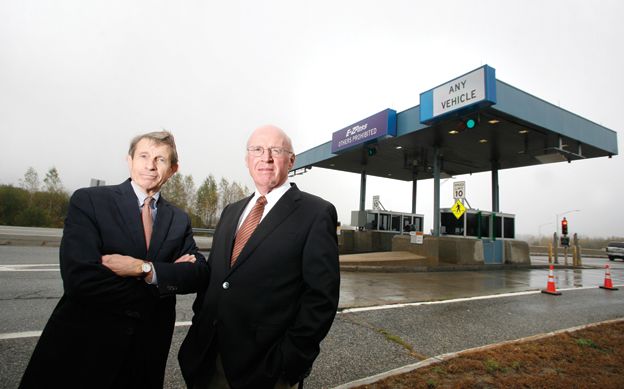Changing lanes | A new leadership team at the Maine Turnpike Authority rethinks its autonomy and contracting practices
 Photo/Tim Greenway
Peter Mills, left, and Dan Wathen are overseeing the turnpike's overhaul
Photo/Tim Greenway
Peter Mills, left, and Dan Wathen are overseeing the turnpike's overhaul
Recent turmoil at the Maine Turnpike Authority, which includes the forced departure of its executive director, a critical investigative report and lengthy legislative hearings, has died down. A new director, former state Sen. Peter Mills, and a new board chairman, former Chief Justice Dan Wathen, are now in charge. But balancing transportation needs between the toll road and other state highways may be a more daunting challenge, and will undoubtedly take longer to resolve.
The Maine Turnpike, consisting of just over 100 miles from Kittery to Augusta, is admired as the state’s best-maintained highway, and the gateway to 75% of its gross state product, says Bruce Van Note, the deputy transportation commissioner who serves on the Maine Turnpike Authority board as DOT’s designate.
The road has its own maintenance crews, State Police troop and central office because its condition is vital to bondholders, Van Note adds. It can’t be managed any other way without compromising the turnpike’s financial integrity, and is quite different from the way DOT — like its counterparts in other states — does its budgeting. “We see how much money is coming in [through fuel taxes and fees] and figure out how far we can make it go,” Van Note says. The turnpike authority, on the other hand, calculates how much it will take to keep things up to standard and then raises tolls, if necessary, to meet those demands.
While the tolls are sometimes resented by those who use the road daily, as opposed to the “free” interstate sections elsewhere, conditions are also the envy of those who must drive over pot-holed and crumbling state roads in many parts of Maine.
But the very uniqueness of the turnpike, and the virtual autonomy of the board in charge of it, contributed to a whopper of a scandal last year. It ultimately led to the resignation in March of 17-year Executive Director Paul Violette, after a report from the Office of Program Evaluation and Government Accountability raised questions about turnpike management and spending. Violette has since been sued by his former agency, which claims he diverted more than $500,000 for his personal use.
The authority board quickly turned to Mills, much admired for his keen mind and probity, to replace Violette. On Mills’ recommendation, Gov. Paul LePage then appointed former state Supreme Court Chief Justice Dan Wathen to take over for authority Chairman Gerald Conley Sr., who is 81 and remains on the board. The impact of the changes are already being felt by Maine-based contractors who are winning more turnpike bids, by lawmakers seeing new open-mindedness and fiscal restraint by the authority, and by turnpike overseers who are assessing governance changes to work more cooperatively with the state DOT and to find new revenue sources.
Mills and Wathen commented on the new management team’s work over the past six months in separate interviews.
While Violette’s resignation and alleged misconduct has garnered most of the headlines, Mills sees the turnpike’s dependence on its longtime engineering firm, HNTB, as another pressing concern. HNTB, based in Kansas City, Mo., is a leading national highway engineering and design firm and has had an intimate relationship with state toll roads, particularly for those, like Maine’s, launched before passage of the federal Interstate Highway Act in 1956.
Mills notes that, in Texas, HNTB houses 200 employees in the same building as the Texas Tollway Authority, working side-by-side with state employees. While Mills doesn’t question the integrity of HNTB’s work in Maine — “They do a good job,” he says — he does think it’s time to bring more diversity into the turnpike’s $100 million annual budget, now largely controlled by HNTB’s recommendations. The first rounds of competitive bidding have already taken place (See “Contracts: Up for grabs,” below.)
Mills took immediate steps to distance himself from the style of his predecessor, whom numerous critics have described as arrogant and aloof. Sen. Dawn Hill, who made the request that launched the OPEGA report, says, “We could never get a meeting” with Violette, despite her York constituents’ many concerns about the turnpike’s attempt to relocate its southern toll plaza in their town.
Not only has Mills met with York’s selectmen and citizens, “but he’s given us his cell phone number and asked us to call,” she says.
The upheaval at turnpike headquarters has already produced many changes in an agency that once seemed largely immune to them.
A series of changes
Mills, who came on as an interim director, was recently confirmed by the Legislature for a one-year term. While the executive director is appointed annually by the turnpike board, the job has never required legislative confirmation in the past.
The Legislature’s transportation committee also seems newly energized in its oversight role. The turnpike budget, weighing in at about $108 million, has been trimmed significantly, including a $4 million reduction in operating expenses. (For 2013, the budget is expected to rise to $133 million, reflecting a planned toll increase.) While most attention has been devoted to the travel and entertainment line, which was cut in half, the bulk of the current savings comes from a reduction in toll collection salaries, made possible by increased use of the EZ Pass electronic toll system.
The turnpike is also looking into whether an all-electronic system would work — something its critics insist would replace the need for an expanded toll plaza in York — and has commissioned a formal study. Mills has his doubts, pointing out that “at least half the traffic at York is from out of state.” Billing such drivers based on photos taken of their license plates, the alternative to EZ Pass accounts, may not produce the desired revenue, he says.
But Mills earns praise for questioning the rationale that seemed to be driving the turnpike’s three-year quest to replace the toll plaza. While toll-taking can be a barrier to traffic, Mills says it’s now clear that the I-95 bridge over the Piscataqua River is actually a bigger factor in holiday weekend congestion, most dramatically, a 19-mile backup on Labor Day that extended all the way north to Wells.
Sen. Hill thinks there may need to be a formal study of how to alleviate congestion from the bridge; for now, there’s a working group of New Hampshire and Maine officials to consider short-term fixes.
Still, there are those who wonder how a lone official could have apparently evaded any checks on his personal spending, as Violette is alleged to have done. The state Attorney General’s Office has opened a criminal investigation of Violette and, according to Mills, investigators spent two days at the authority’s office. The AG has not brought any charges yet. In his public responses to date, Conley, the former board chair, says only that he didn’t know any of the requests were improper.
The new chair, Dan Wathen, says he had little background in highway management when he took the job, but he has spent time analyzing the turnpike’s governance structure. What he found surprises him.
Under the turnpike’s bylaws, it’s the board chair who has signing authority, not the executive director. That means every invoice and budget request has to be approved by the chair, who is also designated the CEO. “That’s quite unusual, in my experience, where nonprofit boards are concerned,” Wathen says.
Despite the pending legal action against Violette, everyone seems anxious to move on. Sen. Roger Katz, the Augusta Republican who co-chaired the Legislature’s oversight committee, says lawmakers are largely satisfied with the changes the turnpike has made. “A lot of this is about people doing their jobs,” he says. “The structure alone cannot guarantee it’s going to happen.”
Merge signs?
Recent public scrutiny of the turnpike authority has revived, in a small way, discussion about whether the turnpike needs to remain autonomous, as in most states with toll roads, or incorporated within DOT, as New Hampshire did when its three turnpikes were built.
Bruce Van Note at DOT says succeeding legislatures have studied the question and taken no action, in part because the turnpike is so efficient; in fact, Maine pioneered the use of revenue bonds to raise money for road-building, a model that remains in place.
“By careful management, they’ve been able to raise a lot of money very affordably,” Van Note says. “While 4% interest may sound like a lot at the moment, historically it’s been a very good deal for the state.”
Transferring bonding authority to the state would be an involved process, at best, and helped convince advocates of a merger, such as former Gov. Angus King, to leave well enough alone.
Still, there is growing pressure for a relatively cash-rich turnpike authority to help out an increasingly cash-strapped DOT. Republicans at the Legislature decided, for the first time in more than a decade, not to propose a highway bond issue this year and also repealed indexing provisions that added, on average, a little over 1 cent to the gasoline and diesel taxes every two years. “If only they realized how difficult that was to get in the first place, they never would have done it,” King says.
State transportation officials were recently told by U.S. Transportation Secretary Ray LaHood at their annual convention in Washington, D.C., that the Obama administration plans no gas tax increase, and that states should look at tolling as an option to increase revenues.
The turnpike authority can raise tolls on its own; the increase scheduled for 2013 will help pay off the final installment on the widening from York to Scarborough, completed in 2004. But its budget is less than one-sixth of DOT’s, so its ability to assist is limited. Reforms enacted by the Legislature will resume annual transfers, but the $5 million the turnpike will pay to DOT next year will only make up for revenue that would otherwise have been raised by fuel tax indexing, Hill notes.
Still, it’s clear that the turnpike will be playing a bigger part in road and bridge projects in southern Maine, along the corridors recognized by federal highway planners. The mammoth job of replacing or upgrading the three bridges between Kittery and Portsmouth, N.H. — now estimated at $250 million — cast the turnpikes of both states in starring roles.
Under consideration by the new Interstate Bridge Commission is a plan for each state’s turnpikes to contribute $1 million annually to a sinking fund that would finance the bridge projects. DOT’s $30 million share of the initial outlays would be financed by selling the remaining 1.9-mile state-owned section of I-95, just north of the bridge, to the turnpike.
The turnpike is also working with DOT on a proposed Gorham bypass, in which expenses would be shared. Van Note says he’s cautiously optimistic the bypass will continue on course toward federal funding. That wasn’t the case with the state-funded bypass proposed for Route 1 in Wiscasset, which has been scrapped.
Finding savings
Funding will remain a major concern for both the turnpike and DOT, in Mills’ view. He’s taking a hard look at bridges that cross the turnpike in towns like Litchfield and Sabattus — there are eight in Litchfield alone, one per mile — to see if all are still needed.
He points out that several bridges were built with just one lane, and traffic volumes can be extremely light. According to turnpike Operations Director Peter Merfeld, only 160 cars a day use the Lunts Hill Road bridge, one span now up for consideration that would cost $2.6 million to overhaul. “We could probably buy all the real estate around it for that price,” Mills says.
Maintaining existing roads was paramount when the turnpike’s northern section was built in 1956, but with the 55-year-old spans coming due for replacement, keeping them all may not be the best use of limited funds, Mills says. He’s already met with Litchfield and Sabattus selectmen to begin the discussion.
Mills is willing to take on previously taboo subjects, such as pay for the turnpike’s unionized toll collectors. “We’ve never gone back to see if some of these provisions are still justified,” he says. He singles out double overtime pay for holiday shifts, something he says he’s never seen anywhere else in state government. Negotiations for a new contract have begun.
But the new director is also unabashed in his view that Maine roads need more funding, and he questions the reluctance of transportation advocates to straightforwardly name a price.
He’s not shy about it himself. “I’ve been saying we ought to put another 10 cents on the gas tax at both the state and federal level, and then put it on the ballot for the people to decide.”
Such a referendum is within the Legislature’s authority — it’s how a mandatory seat belt law was first adopted in 1995 — and may be the only way to get lawmakers to act, he believes, after his own 16-year tenure in the Senate and House.
“It’s not a subtle point,” he says. “We’re talking about steel and asphalt, and we know what those cost. It is the kind of thing you try when everything else has failed.”
For his part, Wathen is looking forward to the challenges of transportation planning. “I hadn’t thought much about it before, but this looks like an exciting time to get involved,” he says.
Douglas Rooks, a writer based in West Gardiner, can be reached at editorial@mainebiz.biz.
Editor's note: This is a corrected version of the original story that clarifies Gerald Conley Sr.'s time on the turnpike board.










Comments